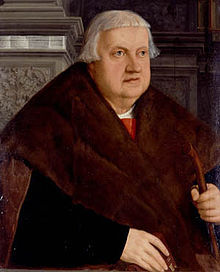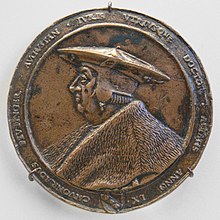Konrad Mineer – Wikipedia





Copyright (Born October 14, 1465 in Augsburg, † December 28, 1547 ibid) was a lawyer, humanist and antiquarian. As a Augsburg city clerk, he was one of the most important politicians in the Reichstadt in the Reformation. He was a consultant of Emperor Maximilian I and his successor Emperor Karl V.
Peutinger came from a respected merchant family of the Reichstadt Augsburg. After studying in Bologna and Padua, where he did his doctorate to the doctor of both rights, he struck a career as a lawyer. In doing so, he got to know the movement of Renaissance humanism more intensively, which should accompany him for life. In 1493 he was elected syndicus in his hometown Augsburg. As a member of the same, he attended several Reichstagen and was appointed Imperial Council by Maximilian I. From 1497 to 1534 Peutinger was also city clerk in Augsburg, where he acquired a still preserved property in 1515, the so -called Peutingerhaus. Even if the connections to Maximilian’s successor Karl V were loose, Peutinger was able to claim his position in Augsburg as well as at the national level. It was not until 1534, after the failure of his politics, which aimed at a balance between the arguments of religious parties, the Reformation was introduced in Augsburg, he resigned from his office as city clerk. He died in Augsburg on December 28, 1547. Previously, he was raised to hereditary nobility by Emperor Karl V.
In addition to maintaining contacts with other humanistic scholars such as B. Erasmus von Rotterdam received the connections to Italy in order to continue to get numerous new books of legal or humanistic content, i.e. the old language-philological content. Peutinger was not only interested in books from Italy, he also had contacts with printers in his hometown of Augsburg, Basel and Strasbourg. He may have been in contact with the humanist Jacob Sturm about the Strasbourg. Over the years, Peutinger collected an extremely remarkable library. His friends also included the Nuremberg merchant and humanist Willibald Pirckheimer, who in turn was friends with the well -known painter Albrecht Dürer. The gathering of a library, which is exceptionally large for the situation at the time, corresponds to this mindset.
Peutinger was present at the Reichstag of Worms in 1521 during the negotiation of the “Causa Lutheri”. His report on this negotiation for the Augsburg Council has been preserved and an important source for the actual course of the negotiation in which Martin Luther refused to deny his writings. This report lies u. by the church historian Theodor von Kolde in his “Sweeper Lutherana” edited.
When the Nuremberg merchants and the Fuggern interest rates and monopoly abuse were accused at the Reichstag in Augsburg in 1530, the lawyer Konrad Peutinger appeared as a defender of the merchants. He spoke out against interventions by the state in pricing and rejected the responsibility of the large merchants for the price increases in the empire. He argued with the right to free entrepreneurship and emphasized that the economic persecution of self -interest ( personal advantage ) the economy overall and thus also to an increased common good ( Commodity State ) leads. He took a line of argument that should later become the basis of capitalism and the free market economy. Nevertheless, a monopoly ban was decided by the Reichstag, but this was never executed for the Fuggern and Welsern, due to its importance for Emperor Karl V. [first]
His collections of ancient remains and his writings to explore the Roman antiquity of his home region became particularly important for the development of historical sciences. A Roman stone memorial collection founded by Peutinger became the foundation of the Augsburg Roman Museum. Even today, parts of his collection of Roman stone monuments can be seen in his Augsburg residential building, the so -called Peutingerhaus.
His work continues to have an outstanding meaning Roman inscriptions (Augsburg 1520) and the tabula Peutingeriana named after him, a late antique street map of the Roman Empire, which later turned out to be one of the most important sources from this period. Peutinger received the card from Conrad Celtis from Vienna in 1507 and then prepared a publication, which, however, only came about after his death. In addition, the first edition of the History of the Goths of the Jordan and the History of Lombards PAUL Paul Deacon.
In his hometown of Augsburg, the Peutinger Gymnasium and Peutingerstrasse (on which the Peutingerhaus is located) are still reminiscent of him.
On December 27, 1499, Peutinger married Margarete Welser, who brought a considerable assets from the Welser family into marriage and was supposed to survive it by five years. At least eight children emerged from the marriage.
- Juliana Peutinger (1500–1506), kept a Latin speech in front of Emperor Maximilian I.
- Constantia Pein (1503-1546)
- Claudius Pius Niner (28. October 1509-1552)
- Christoph Pnight (1511-11. April 1576)
- Chrisostomus Steer (1512-1577)
- Johann Chrisostomus Peutinger (1513; date of death unknown)
- Carl Stie (1515-1564)
- Conrad Pius Niner (1520-1613)
16th century expenses
- Konrad Millions: Roman turpisters fragments , Augsburg 1505
- Konrad Millions: Inscriptiones of ancient Roman and their fragments in Augusta and his diocese , [Mainz] 1520 (revised version)
Modern editions of sources and works of Peutinger
- Erich König (ed.): Konrad Peutinger’s correspondence. C. H. Beck, Munich 1923 (critical edition; Digitized )
- Hans-Jörg Künast (ed.): The library and the handwritten estate Konrad Peutinger. Part 1: The Konrad Peutinger library. Edition of the historical catalogs and reconstruction of the stocks. Niemeyer, Tübingen 2003 ff.
- Volume 1: Hans-Jörg Künast, Helmut Zäh: The autographs catalogs of Peutinger, the non-Jurist library part (= Studia Augustana. Bd. 11). 2003, ISBN 3-484-16511-1;
- Volume 2: Hans-Jörg Künast u. A.: The autographs catalogs of Peutinger, the legal library part (= Studia Augustana. Bd. 14). 2005, ISBN 3-484-16514-6.
- Werner Bischler: Of the emperor man for all cases. The city clerk Konrad Peutinger. In: Augsburg history (s). Band 1. Wissner, Augsburg 1994, ISBN 3-928898-73-6, S. 47–55.
- Monika Grünberg-Dröge: Konrad afternoon. In: Biographical-bibliographical church lexicon (BBKL). Band 7, Bautz, Herzberg 1994, ISBN 3-88309-048-4, Sp. 392–397.
- Rolf Kießling (ed.): Konrad Peutinger. A universal scholar between late Middle Ages and early modern times: inventory and perspectives Berlin: De Gruyter 2019 (Symposia Augusta, 35), ISBN 978-3-11-057504-0.
- Erich König: Northerstudent (= Studies and representations in the field of history. Bd. 9, H. 1/2, ZDB-ID 310176-1 ). Herder, Freiburg (Breisgau) 1914 ( Digitized )
- Hans-Jörg Künast, Jan-Dirk Müller: Theepies, Conrad. In: New German biography (Ndb). Volume 20, Duncker & Humblot, Berlin 2001, ISBN 3-428-00201-6, pp. 282–284 ( Digitized ).
- Heinrich Lutz: Conrad Peutinger: Contributions to a political biography. Die Brigg, Augsburg 1958, DNB 453117279 (= Treatises on the history of the city of Augsburg , Band 9, ISSN 0724-9829 , at the same time dissertation at the University of Munich, 1953, DNB 480435413 )
- Martin there: The discovery of antiquity. Dealing with the Roman past in southern Germany in the 16th century (= Munich historical studies, Bavarian history department. Vol. 17). Lassleben, Kallmünz 2002, ISBN 3-7847-3017-5 (at the same time dissertation, University of Munich 2000), in particular the chapter The Augsburg Inscription Syllogs of Konrad Peutinger , S. 100–122.
- Collected memory. Konrad Peutinger and the cultural tradition in the 16th century. Accompanying publication for the exhibition of the Augsburg State and City Library on the occasion of the 550th birthday Konrad Peutinger (state and city library Augsburg. Cimeliensaal 1) . Published by Reinhard Laube and Helmut Zäh. Lucerne 2016.
- ↑ Pastperfect: Konrad Peutinger’s Business Ethos, Speyer: 1530 , Web project of the history faculty of the University of Vienna
Recent Comments